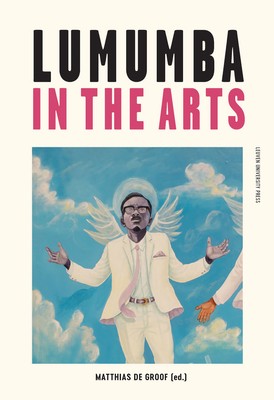
- Išsiųsime per 10–14 d.d.
- Leidėjas: Leuven University Press
- Metai: 2019
- Puslapiai: 400
- ISBN-10: 9462701741
- ISBN-13: 9789462701748
- Formatas: 19.1 x 28.2 x 3.3 cm, minkšti viršeliai
- Kalba: Anglų
- Extra -15 % nuolaida šiai knygai su kodu: ENG15
Lumumba in the Arts + nemokamas atvežimas! | knygos.lt
Atsiliepimai
Aprašymas
It is no coincidence that a historical figure such as Patrice Emery Lumumba, independent Congo's first prime minister, who was killed in 1961, has lived in the realm of the cultural imaginary and occupied an afterlife in the arts. After all, his project remained unfinished and his corpse unburied. The figure of Lumumba has been imagined through painting, photography, cinema, poetry, literature, theatre, music, sculpture, fashion, cartoons and stamps, and also through historiography and in public space. No art form has been able to escape and remain indifferent to Lumumba. Artists observe the memory and the unresolved suffering that inscribed itself both upon Lumumba's body and within the history of Congo. If Lumumba - as an icon - lives on today, it is because the need for decolonisation does as well.
Rather than seeking to unravel the truth of actual events surrounding the historical Lumumba, this book engages with his representations. What is more, it considers every historiography as inherently embedded in iconography. Film scholars, art critics, historians, philosophers, and anthropologists discuss the rich iconographic heritage inspired by Lumumba. Furthermore, Lumumba in the Arts offers unique testimonies by a number of artists who have contributed to Lumumba's polymorphic iconography, such as Marlene Dumas, Luc Tuymans, Raoul Peck, and Tshibumba Kanda Matulu, and includes contributions by such highly acclaimed scholars as Johannes Fabian, Bogumil Jewsiewicky, and Elikia M'Bokolo.
Contributors: Balufu Bakupa-Kanyinda (artist), Karen Bouwer (University of San Francisco), Véronique Bragard (UCLouvain), Piet Defraeye (University of Alberta), Matthias De Groof (scholar/filmmaker), Isabelle de Rezende (independent scholar), Marlene Dumas (artist), Johannes Fabian (em., University of Amsterdam), Rosario Giordano (Università della Calabria), Idesbald Goddeeris (KU Leuven), Gert Huskens (ULB), Robbert Jacobs (artist), Bogumil Jewsiewicki (em., Université Laval), Tshibumba Kanda Matulu (artist), Elikia M'Bokolo (EHESS), Christopher L. Miller (Yale University), Pedro Monaville (NYU), Raoul Peck (artist), Pierre Petit (ULB), Mark Sealy (Autograph ABP), Julien Truddaïu (CEC), Léon Tsambu (University of Kinshasa), Jean Omasombo Tshonda (Africa Museum), Luc Tuymans (artist), Mathieu Zana Etambala (AfricaMuseum)
This publication is GPRC-labeled (Guaranteed Peer-Reviewed Content).
EXTRA 15 % nuolaida su kodu: ENG15
Akcija baigiasi už 5d.23:36:37
Nuolaidos kodas galioja perkant nuo 10 €. Nuolaidos nesumuojamos.

- Leidėjas: Leuven University Press
- Metai: 2019
- Puslapiai: 400
- ISBN-10: 9462701741
- ISBN-13: 9789462701748
- Formatas: 19.1 x 28.2 x 3.3 cm, minkšti viršeliai
- Kalba: Anglų
It is no coincidence that a historical figure such as Patrice Emery Lumumba, independent Congo's first prime minister, who was killed in 1961, has lived in the realm of the cultural imaginary and occupied an afterlife in the arts. After all, his project remained unfinished and his corpse unburied. The figure of Lumumba has been imagined through painting, photography, cinema, poetry, literature, theatre, music, sculpture, fashion, cartoons and stamps, and also through historiography and in public space. No art form has been able to escape and remain indifferent to Lumumba. Artists observe the memory and the unresolved suffering that inscribed itself both upon Lumumba's body and within the history of Congo. If Lumumba - as an icon - lives on today, it is because the need for decolonisation does as well.
Rather than seeking to unravel the truth of actual events surrounding the historical Lumumba, this book engages with his representations. What is more, it considers every historiography as inherently embedded in iconography. Film scholars, art critics, historians, philosophers, and anthropologists discuss the rich iconographic heritage inspired by Lumumba. Furthermore, Lumumba in the Arts offers unique testimonies by a number of artists who have contributed to Lumumba's polymorphic iconography, such as Marlene Dumas, Luc Tuymans, Raoul Peck, and Tshibumba Kanda Matulu, and includes contributions by such highly acclaimed scholars as Johannes Fabian, Bogumil Jewsiewicky, and Elikia M'Bokolo.
Contributors: Balufu Bakupa-Kanyinda (artist), Karen Bouwer (University of San Francisco), Véronique Bragard (UCLouvain), Piet Defraeye (University of Alberta), Matthias De Groof (scholar/filmmaker), Isabelle de Rezende (independent scholar), Marlene Dumas (artist), Johannes Fabian (em., University of Amsterdam), Rosario Giordano (Università della Calabria), Idesbald Goddeeris (KU Leuven), Gert Huskens (ULB), Robbert Jacobs (artist), Bogumil Jewsiewicki (em., Université Laval), Tshibumba Kanda Matulu (artist), Elikia M'Bokolo (EHESS), Christopher L. Miller (Yale University), Pedro Monaville (NYU), Raoul Peck (artist), Pierre Petit (ULB), Mark Sealy (Autograph ABP), Julien Truddaïu (CEC), Léon Tsambu (University of Kinshasa), Jean Omasombo Tshonda (Africa Museum), Luc Tuymans (artist), Mathieu Zana Etambala (AfricaMuseum)
This publication is GPRC-labeled (Guaranteed Peer-Reviewed Content).




Atsiliepimai